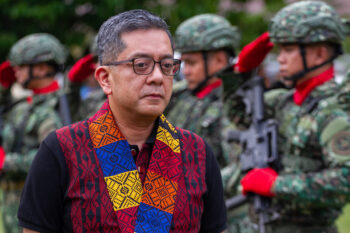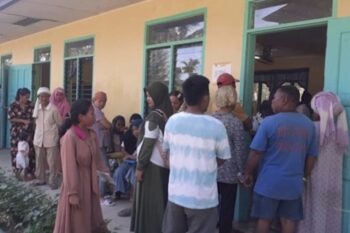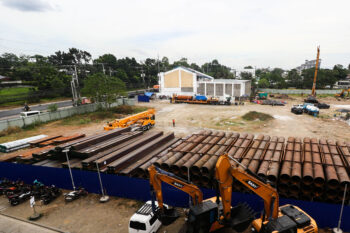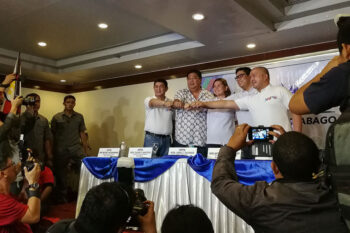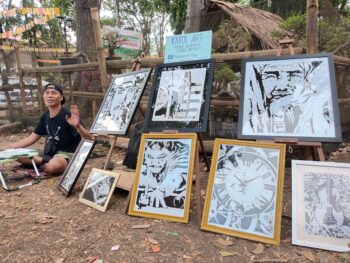(Keynote Speech at the 3rd ADMU SOSS Research Conference during the Opening Ceremonies on 12 October 2020)
DAVAO CITY (MindaNews / 12 October) — Dr.Fernando Aldaba, Dean of the Ateneo de Manila University School of Social Sciences, Prof. Joselito Sescon, chair of the 3rd SOSS Research Conference, friends and colleagues, good morning! It is an honor and a distinct relief to be among academics and social scientists today at this conference. Thank you for the privilege of delivering this keynote address.
Our conference theme is very alliterative – Modernities, Maladies and Maneuverings. For this keynote, I will be drawing on my experiences, examinations, and conceptualizations of change where we are. I pray that this virtual assembly can relate.
Like everyone else here, I struggle to stay one step ahead of the rapid-fire changes in all aspects of our lives made necessary by this COVID-19 global pandemic. In particular, it had upended normal ways of going about our work operations – threatening the very basis of our security: Our ability to keep food on our tables.
The Ateneo de Davao where I am employed as the chair of the Psychology Department was the first in Mindanao to switch to online instruction last June.
We’re semestral, and so today, five months after June, is the first day of the final exam week. Today holds promise to be a day of mental health risk for our students, their families, our faculty, and administrators – and most probably their respective families, too. I pray that the internet that binds us together holds fast in the next few days.
When the announcement allowing online summative assessments went out two weeks ago, I tried to get out of doing the keynote address today, but the conference host Prof Joey Sescon and my friend Dr Jowel Canuday refused to hear about it. It’s just as well, I think. We all deserve to reclaim some vestige of normalcy to our lives. Academics and scientists should hold conferences.
It’s what we do. And so I resolved to prepare a talk today.
And then as if to underline just how the world had gone insane in 2020, my house got flooded four nights ago. I am all of 5 feet one inch tipping the scales at 90 pounds, but I am proud to tell you that I was able to carry my refrigerator up a flight of stairs. Of course, today, it’s still up there. And before you ask where my husband is through all this, he is on the other side of mainland Mindanao trying to dodge coronavirus infection as he goes about doing community work for Marawi rehab. So when bad things happen, I have to convince myself that I am a strong independent woman.
I will survive this, learn from it, and come out stronger on the other side. In other words, I’ll just have to live what I teach about community resilience and trauma recovery.
What is 2020? For years, we’ve been led to think that the term 20/20 is synonymous with clarity or a clear-eyed vision. That is not the case today. There is nothing that is clear about where we are right now in the course of world history, much less about where we are headed. What is 2020?
We tell our students that the best way to understand the problem is to define it, describe it and put a name to it. To examine and conceptualize it.
What is 2020? Is it – as I placed on my cover slide – Tiempos de peligro? Are we living in a time of perils? Are we at the precipice where one wrong step could drag us down into an abyss from where there’s no returning?
Are we at the Hinge of History? Indeed, the events of 2020 have inspired a lot of philosophical musings on our existential risk, happening as they are at a time when we as a species have the ability to misdirect technology to cause catastrophe or irreversibly damage the biosphere. Think of Trump tripping on dexamethasone kicking around a nuclear football that can blow up the world. It is a scary, scary thought.
Last year, addressing a Democracy and Disinformation forum here in Davao, I toyed with the idea of The Age of Accelerations, a takeaway from journalist Tom Friedman’s 2018 book Thank You for Being Late: An Optimist’s Guide to Thriving in the Age of Accelerations. Of course, we want to be the optimist. Of course, we want to thrive. But Friedman rightly warns that, “Technology is now accelerating at a pace the average human cannot keep up with” (Friedman, MIT Compton Lecture, Fall 2018) and that is grim news for Luddites like me. If it ain’t broke, I’ll say why fix it? Ah, but today it’s broke.
I suggest the book as required reading for senior colloquium among our graduating students. It makes a clear case of defining where we are and where they are headed in the workplace of the future – right in the middle, Friedman says, of three giant accelerations: Changes involving markets, the Earth’s climate, and technology. These swelling changes are interacting to sweepingly reshape social and economic life on a global scale. Where we are puts a premium on “learning faster, and governing and operating smarter.”
More recently, a term introduced by medical anthropologist Merill Singer in the mid-1990s is being resurrected and appropriated – rightly or wrongly – by some medical scientists. The Lancet, that British medical journal, recently released a major report on “The Global Syndemic of Obesity, Undernutrition, and Climate Change”. A syndemic is – and I go back to Singer for this – the way that epidemics can overlap with other epidemics and with other social and cultural problems. Any public health epidemic has a biological element that weakens the immune system. But there is also a social and community health element – for example: poor health care, unsanitary living conditions, and living in close quarters (conditions that characterize the epidemic of poverty). These sociocultural conditions – the epidemic of poverty, so to speak (if I may be allowed to appropriate the term) – allow the public health epidemic to thrive. We see that the effect of these two epidemics are amplified in vulnerable groups to form what Singer calls a syndemic.
Those are some conceptualizations of 2020. They all point to the necessity to change our behavior to survive these perilous times.
Today, as we confront the reality of the invisible enemy, we beat a general retreat to the safety of our homes. SAVE MONEY, SAVE LIVES. STAY HOME.
Save money, as we might lose our jobs any time now. The anxiety and uncertainty can be mind-numbing when the prospect of an unceremonious march to the poorhouse stares us in the face. Seeing this slogan worn by frontliners out there on the streets is enough to make me slide into an existential crisis.
Stay home, it says. But we’re not really safe in our homes as we need to go out for supplies or have it brought in from outside. I stayed home and got invaded by a potentially disease-carrying flood four nights ago. Or another 6.9 magnitude earthquake could hit again. So, no, we’re not totally safe at all.
But to go back to COVID-19 in our third-world country, how do we protect the populations rendered vulnerable? When crowded living conditions do not allow for social distancing, where there is no running water for frequent 20-second handwashing, when PPE and masks could not be part of the household budget – and if they are, there are no facilities for proper disinfection and disposal? The floodwaters brought some discarded masks and face shields into my home. This is another grim reminder of the COVID-19 pandemic impacting inefficient floodwater and solid waste management impacting what amounts to a natural disaster for my home. Public health crisis impacting governance: suffer vulnerable me.
As a psychologist, I help people come to terms with inevitable and drastic changes to their lives – especially those that had been brought to bear upon them by human-initiated and natural hazard-induced disasters. It never is an easy task to help people transition to the knowledge that there is no going back. The only way is to go forward.
We’re accelerating forward at top speed. Five years’ change in five months. And the world is never the same again. We now realize what we did not know seven months ago: COVID-19 is not going to end soon. How will people adapt to the change required of surviving 2020 and beyond? Will we evolve new behaviors that will allow us to survive these perilous times? What’s the science to behavior modification?
Well, we do see that some necessary changes have been embraced. Universal mask-wearing for example, kicked in really early in our communities. Why did it stay beyond the ningas cogon, knee jerk fear response? I think it is because human beings are hard-wired for hedonic adaptation – that is, to adapt new changes in behavior if these can be made to bring more pleasure than punishment. The maintenance of mask-wearing behavior is something like turning lemons into lemonade. It’s hot, it causes pimples, it’s what robbers wear. So, if we have to wear a mask, let it be a fashion statement or an assertion of identity.
Hedonic adaptation is a phenomenon that I like reflecting on. The first time that hinterland communities along the Bukidnon-Davao Highway got energized, for example, I saw how the advent of electricity change the daily lives of the residents. In the mid 2000’s I observed it to be the entry of TV and the karaoke, pushing back the bedtime for the young and old alike.
Or last year, in the aftermath of the Mindanao earthquakes, I found encampments of gaily colored tents popping up under tree plantations in North Cotabato. Residents afraid to return home while the aftershocks were playing out camped out in a festive setting. It looked like a circus or a fiesta. It’s as if it can’t be so bad when we can still sing, be entertained, and be like the rainbow. Such positivity bodes well.
We use the concept of hedonic adaptation to help disaster survivors take baby steps towards regaining control of their lives. In some communities we work with here in Mindanao, for example, we include lipstick among the emergency supplies we bring in. Women community workers appreciate this little gift to light up their faces and perhaps to use it seemingly as a badge when they represent their communities to the world at large. You can really see the change in demeanor when they put on lipstick. They look like they can now take on the world.
Some of the changes imposed by the COVID-19 public health situation will stay with us. It, they say, takes 28 days to form a habit. We are well past 28 days. By now, we are all in the habit of washing our hands frequently, of donning personal protective equipment when we get out of the house, of protecting our personal space. Habits become automatic as they become part of our daily routine.
But what about behaviors in one-off situations? After four months of probably the longest lockdown, when we emerged from isolation to be with friends and family again, we noticed that awkwardness of greeting. No more kissing and hugging – and stay six feet away. Pull up the mask when you or they can’t pull back. Keep it short and sweet and out in the open. This is abnormal. Skin hunger is painful and, yes, traumatic.
In his 2019 commencement speech at the University of Asia and the Pacific, my contemporary at UP Visayas High School, UAP president Stan Padojinog characterized the future as VUCA – volatile, uncertain, complex, and ambiguous. The VUCA future came soon enough.
As a psychologist, I tell you that we’ll do well when we come to terms with our reality.
Modernity will continue to spawn technological advances that will threaten to overtake us or overrun our cognitive bandwidth. It will lead to sweeping changes in our social and cultural fabric before we may be ready for these. It will open new work opportunities while firmly closing off those that we were trained for. We will have to learn new ways of coping, new ways of doing things. And we have to participate because even if we try to escape to the safety of our homes, modernity and its maladies will inevitably come for us.
Our saving grace as a species is that we are more resilient than we believe. We will learn, we will adapt, we will form habits to see us through.
So on that positive note, I will now leave you to get on with our conference. I still have to bring down my refrigerator from upstairs.
Thank you and good morning!
(Wayward and Fanciful is Gail Ilagan’s column for MindaViews, the opinion section of MindaNews. She is the Chair of the Psychology Department at the Ateneo de Davao University. You may send comments to gail.ilagan@gmail.com. “Send at the risk of a reply,” she says.)

